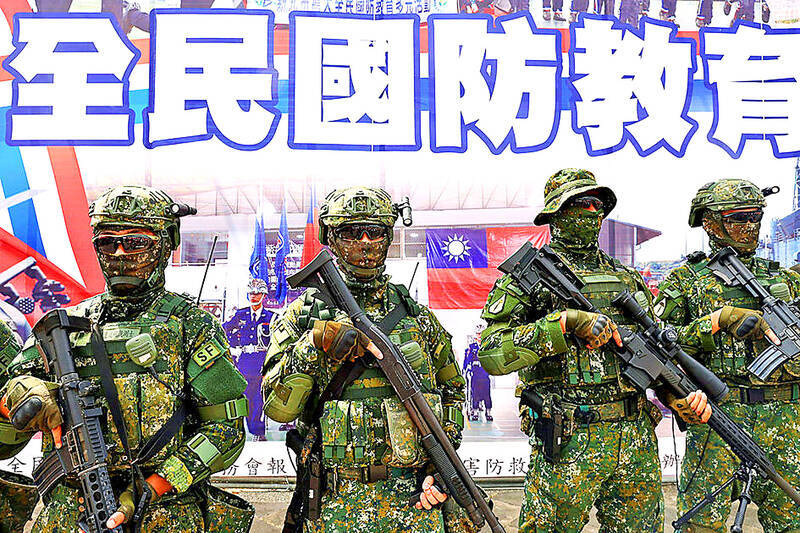The government has unveiled a preview of proposed amendments to rules governing alternative civilian service to bolster the civil defense system.
The Executive Yuan in December 2022 incorporated demobilized alternative civilian service members into the civil defense program by allowing the government to recall men demobilized within the previous eight years to train one day per year.
The amendments would authorize the government to recall former civilian service members to train or serve for longer periods and more often than regulations initially stipulated, the Ministry of the Interior said in a notice posted earlier in the week.

Photo: Ann Wang, Reuters
The government may invoke this power to deal with extreme weather events, geopolitical tensions, natural disasters or to support military operations, the ministry said.
The changes would allow officials to recall former civilian service members dismissed between one and nine years earlier to train in civil defense-related tasks and capabilities, it said.
The proposed regulations require central and local government agencies to request the recall of former civil service members 10 days ahead of time, from the 20 days previously stipulated, the ministry said.
The amendments would also enable the government to call up 50 percent of the total number of civilian service reservists, up from the current 20 percent limit, it said.
The five-day limit on the term of service is to be abolished, it said.
Summonses to serve must reach civilian service members two days before the targeted training event, it said.
Injured or ill service members or those in bereavement, certain family emergencies, or subject to a force or circumstance beyond their control would be exempt from the summons, the ministry said.
The government aims to draft 13,650 men into civilian alternative service this year, an official speaking on condition of anonymity said yesterday.
The government would from next month start accepting applications for would-be military conscripts to apply for alternative service, they said.
The government had hoped to recall 72,000 former civilian alternative service personnel to train in national emergency response this year, but the target was reduced to 50,000 following budget cuts, the source said.
The government last year recalled 50,052 dismissed civilian service members to train for national emergency response, they added.
The government would recall 120 active and reserve civilian service members to participate in the nation’s first Whole-of-Society Defense Resilience Field Exercise in Tainan on Thursday, the official said.

CHAMPIONS: President Lai congratulated the players’ outstanding performance, cheering them for marking a new milestone in the nation’s baseball history Taiwan on Sunday won their first Little League Baseball World Series (LLBWS) title in 29 years, as Taipei’s Dong Yuan Elementary School defeated a team from Las Vegas 7-0 in the championship game in South Williamsport, Pennsylvania. It was Taiwan’s first championship in the annual tournament since 1996, ending a nearly three-decade drought. “It has been a very long time ... and we finally made it,” Taiwan manager Lai Min-nan (賴敏男) said after the game. Lai said he last managed a Dong Yuan team in at the South Williamsport in 2015, when they were eliminated after four games. “There is

Taiwan Semiconductor Manufacturing Co (TSMC, 台積電) is expected to start construction of its 1.4-nanometer chip manufacturing facilities at the Central Taiwan Science Park (CTSP, 中部科學園區) as early as October, the Chinese-language Liberty Times (the Taipei Times’ sister newspaper) reported yesterday, citing the park administration. TSMC acquired land for the second phase of the park’s expansion in Taichung in June. Large cement, construction and facility engineering companies in central Taiwan have reportedly been receiving bids for TSMC-related projects, the report said. Supply-chain firms estimated that the business opportunities for engineering, equipment and materials supply, and back-end packaging and testing could reach as high as

POWER PLANT POLL: The TPP said the number of ‘yes’ votes showed that the energy policy should be corrected, and the KMT said the result was a win for the people’s voice The government does not rule out advanced nuclear energy generation if it meets the government’s three prerequisites, President William Lai (賴清德) said last night after the number of votes in favor of restarting a nuclear power plant outnumbered the “no” votes in a referendum yesterday. The referendum failed to pass, despite getting more “yes” votes, as the Referendum Act (公民投票法) states that the vote would only pass if the votes in favor account for more than one-fourth of the total number of eligible voters and outnumber the opposing votes. Yesterday’s referendum question was: “Do you agree that the Ma-anshan Nuclear Power Plant

Democratic nations should refrain from attending China’s upcoming large-scale military parade, which Beijing could use to sow discord among democracies, Mainland Affairs Council Deputy Minister Shen You-chung (沈有忠) said. China is scheduled to stage the parade on Wednesday next week to mark the 80th anniversary of Japan’s surrender in World War II. The event is expected to mobilize tens of thousands of participants and prominently showcase China’s military hardware. Speaking at a symposium in Taichung on Thursday, Shen said that Chinese Minister of Foreign Affairs Wang Yi (王毅) recently met with Indian Prime Minister Narendra Modi during a visit to New Delhi.